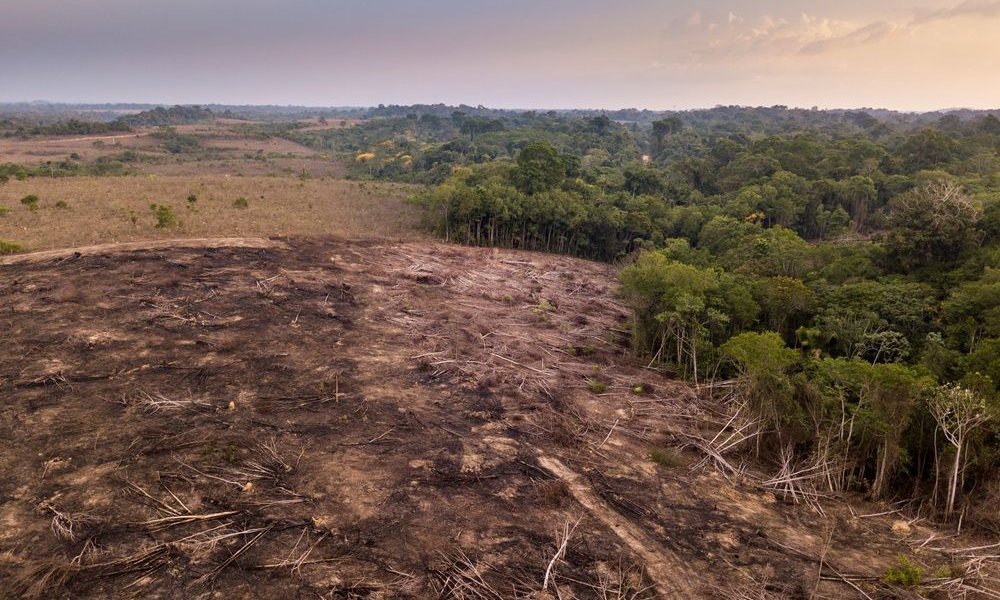At the end of 2021 Storebrand Asset Management placed Bunge Ltd (Bunge) and Archer Daniels Midland (ADM) on its observation list, due to a risk that the companies could be contributing to severe environmental damage. The companies’ purchase of soy produced in Brazil has been associated with a high risk of contributing to deforestation and conversion of native ecosystems.
Deforestation risk from soy production
Soy production is a major driver of deforestation and conversion of native ecosystems. This causes GHG emissions, biodiversity loss, drought, temperature rise and violations of the human rights of indigenous peoples and other forest-dependent communities. According to Trase Earth, which attributes deforestation risk based on market share and deforestation data on the municipal level, Bunge has the highest deforestation risk (10930 hectares) and ADM the second highest (5324 hectares) of all soy exporters in Brazil. The Soy and Cattle Deforestation Tracker operated by Mighty Earth estimates that Bunge may be linked to 59739 hectares of deforestation or clearance of vegetation in Brazil between March 2019 and March 2021. The Tracker links ADM to 7269 hectares of clearance in the same period. Deforestation has been occurring on properties in Bunge’s and ADM’s supply chains.
Storebrand Asset Management considers Bunge’s and ADM’s supplier monitoring processes to have been insufficient to avoid deforestation. One of the key risks we found is that the companies are purchasing a significant percentage of their soy from indirect suppliers, in processes without sufficient traceability. As a result, the companies have not been able to verify that the soy they purchase indirectly is not produced on properties with recent deforestation or conversion.
Deforestation and conversion of native ecosystems have increased sharply in Brazil over the past years. 13200 sq. kilometres of forest was lost in the Amazon between August 2020 and July 2021, a 22% increase from the previous year and the highest area deforested in a year since 2006, according to the Brazilian space research agency INPE. In the Cerrado region, where soy expansion is largest, 8531 sq. kilometres were deforested or converted in the same period, an 8% increase from the previous year.
Deforestation risk for companies operating in or sourcing commodities from Brazil is worsened by the political context in the country. Budgets for monitoring and legal enforcement measures against deforestation have been reduced significantly, and several national legal reform proposals are likely to reduce protection of forests, native ecosystems and human rights of indigenous peoples and forest-dependent communities.
Engagement
Storebrand has been participating in collaborative shareholder engagements with Bunge and ADM, and co-filed a shareholder resolution at Bunge’s AGM in 2021, calling on the company to step up efforts to end supply chain links to deforestation. Both Bunge and ADM have adopted Zero Deforestation Commitments, with target dates for 2025 and 2030, respectively. Storebrand has acknowledged that both companies have made recent improvements to their commitments, policies and action plans, but considers the companies’ respective timeframes for achieving verifiable deforestation-free operations to be too long, and their current efforts insufficient to eliminate deforestation risk from their supply chains. However, Storebrand has also found that Bunge’s and ADM’s recent efforts to improve traceability and monitoring of supply chains may reduce the risk of contributing to deforestation in the future. Therefore, Storebrand placed both companies under observation at the end of 2021.
Observation process
The observation procedures entail that Storebrand monitors company progress closely and continues dialogue with the companies, informing them of our expectations of measures and results. In this case, the dialogue centres around improvements in the following areas:
- Full traceability, transparency and monitoring of direct and indirect suppliers across all commodity supply chains, starting with areas of particularly high deforestation and conversion risk.
- A public commitment to not source commodities from suppliers that have deforested or converted native vegetation, legally or illegally, on any part of their properties after January 1st, 2020. This cut-off date applies to the Cerrado and any ecosystems where earlier cut-off dates are not already in place.
- Insertion of contractual commitments for all suppliers to restore all areas deforested or converted after January 1st, 2020, and all areas illegally deforested or converted prior to 2020.
While companies remain on the observation list, portfolios without prior holdings are restricted from investing in them. Portfolios with prior positions are allowed to maintain these positions.




